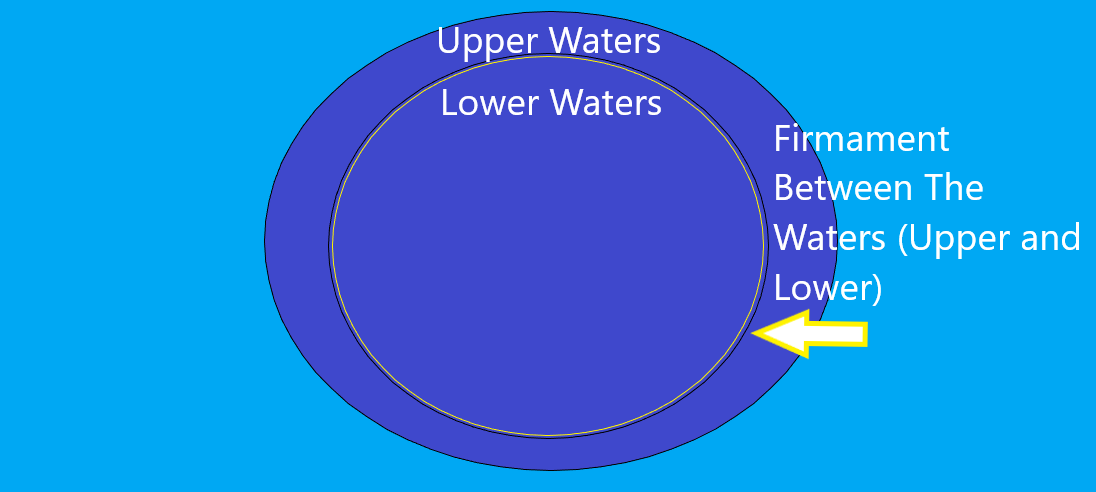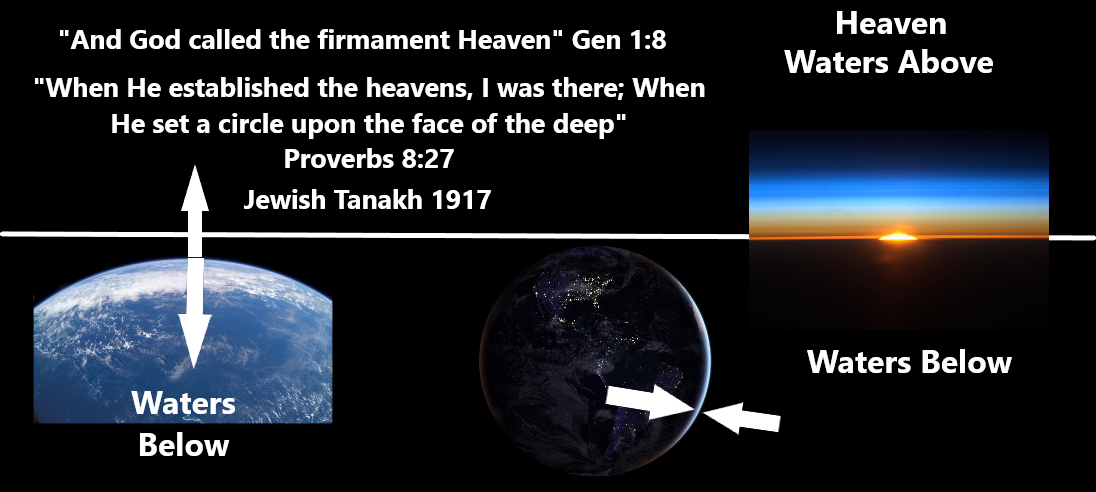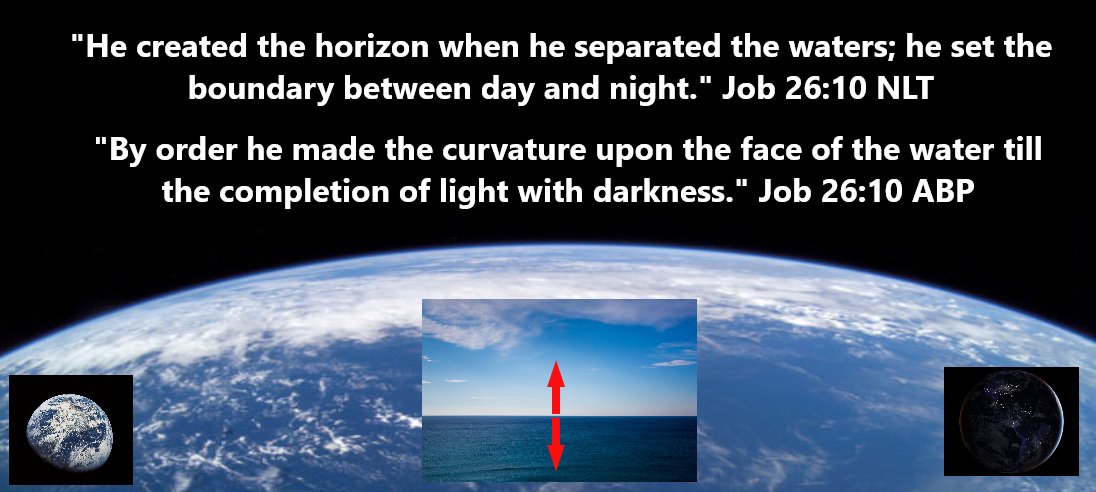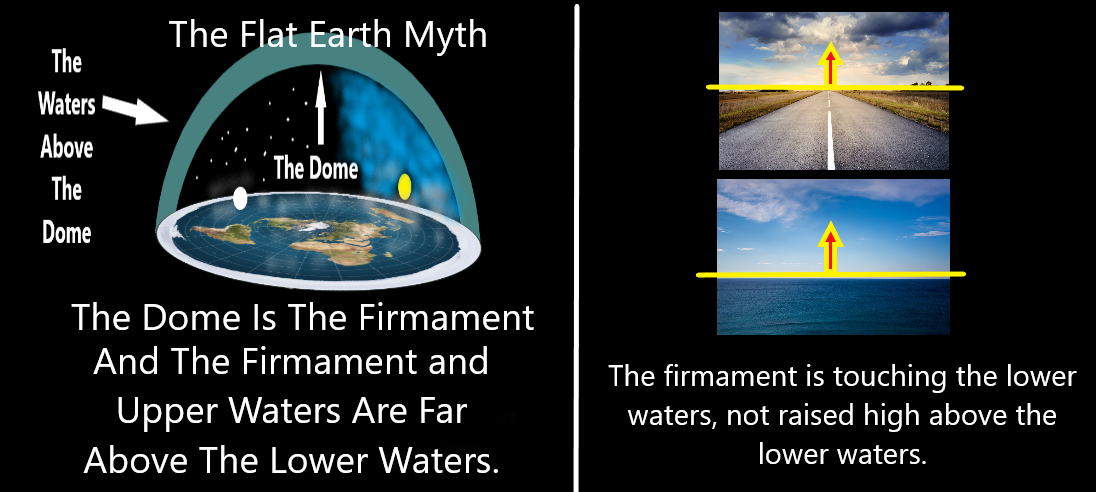The Condition of the Earth at the Start of Creation
Genesis 1:2 "And the earth was without form, and void; and darkness was upon the face of the deep. And the Spirit of God moved upon the
face of the waters."
The planet was covered by water and darkness.
face of the waters."
The planet was covered by water and darkness.
The Seperation of the Waters During Creation
"And God said, Let there be a firmament in the midst of the waters, and let it divide the waters from the waters." (1:6)
God declared a firmament was needed to divide the upper and lower waters.
God declared a firmament was needed to divide the upper and lower waters.
"And God made the firmament, and divided the waters which were under the firmament from the waters which were above the firmament: and it was so." (1:7)
God made the firmament and the waters were divided. The firmament is in direct contact with the lower waters and the upper waters.
God made the firmament and the waters were divided. The firmament is in direct contact with the lower waters and the upper waters.
"And God called the firmament Heaven. And the evening and the morning were the second day." (1:8)
If God called the firmament heaven then that means the firmament expanded upwards.
(Psalm 104:2; Isaiah 40:22, 42:5; Jeremiah 10:12; Zechariah 12:1)
If God called the firmament heaven then that means the firmament expanded upwards.
(Psalm 104:2; Isaiah 40:22, 42:5; Jeremiah 10:12; Zechariah 12:1)
The Firmament Begins At The Dividing Line Between
The Waters Above (In the sky and Space)
And The Waters Below (The Oceans)
The Dividing Line is The Horizon
Proverbs 8:27, and Job 26:10 show the edge of the curvature around the entire planet is the starting point of the firmament because the word "hag/chug" is used in the Hebrew text and the word "gyros" is used in the Greek Septuagint. The Hebrew "chug" and the Greek "gyros" all mean curvature. (see our teachings on this click here).
The boudary between day and night mentioned in Job 26:10 is the point were the sky and the oceans meet.
Darkness/Night: "And the earth was without form, and void; and darkness was upon the face of the deep (waters)..." Genesis 1:2
Light/Day: "And God said, Let there be light: and there was light." Genesis 1:3 - This light was in the sky.
It could also mean from horizon (east) to horizon (west) the start of the day to the end of the day."
What do others say about Job 26:10?
Albert Barnes Commentary: "He hath compassed the waters with bounds - The word rendered “compassed” (חוּג chûg ), means to describe a circle - to mark out with a compass; and the reference is to the form of the horizon, which appears as a circle, and which seems to be marked out with a compass." [1]
Commentary Critical and Explanatory on the Whole Bible (Jamieson - Fausset - Brown): “Rather, “He hath drawn a circular bound round the waters” (Proverbs 8:27; Psalm 104:9). The horizon seems a circle. Indication is given of the globular form of the earth.” [2]
Thomas Coke Commentary on the Holy Bible: “Job 26:10. He hath compassed the waters with bounds— He hath set a circle as a boundary upon the face of the waters, even to the extremity of light with darkness; i.e. to the very edge where light and darkness meet. The horizontal circle is here meant.” [3]
Ellicott's Commentary for English Readers: “He hath compassed the waters with bounds.—Rather, He hath described a circle upon the face of the waters, unto the confines of light and darkness. The phenomenon described is that of the horizon at sea, which is a perfect circle, and which is the limit apparently of light, and beyond which is darkness, for all is invisible.” [4]
Exposition of the Old and New Testament, by John Gill (Job 26:10). In his commentary on Job, Gill quotes a Targum text:
‘he hath decreed that the firmament should be placed upon the face of the waters unto the end of light, with darkness;'” [5]
The boudary between day and night mentioned in Job 26:10 is the point were the sky and the oceans meet.
Darkness/Night: "And the earth was without form, and void; and darkness was upon the face of the deep (waters)..." Genesis 1:2
Light/Day: "And God said, Let there be light: and there was light." Genesis 1:3 - This light was in the sky.
It could also mean from horizon (east) to horizon (west) the start of the day to the end of the day."
What do others say about Job 26:10?
Albert Barnes Commentary: "He hath compassed the waters with bounds - The word rendered “compassed” (חוּג chûg ), means to describe a circle - to mark out with a compass; and the reference is to the form of the horizon, which appears as a circle, and which seems to be marked out with a compass." [1]
Commentary Critical and Explanatory on the Whole Bible (Jamieson - Fausset - Brown): “Rather, “He hath drawn a circular bound round the waters” (Proverbs 8:27; Psalm 104:9). The horizon seems a circle. Indication is given of the globular form of the earth.” [2]
Thomas Coke Commentary on the Holy Bible: “Job 26:10. He hath compassed the waters with bounds— He hath set a circle as a boundary upon the face of the waters, even to the extremity of light with darkness; i.e. to the very edge where light and darkness meet. The horizontal circle is here meant.” [3]
Ellicott's Commentary for English Readers: “He hath compassed the waters with bounds.—Rather, He hath described a circle upon the face of the waters, unto the confines of light and darkness. The phenomenon described is that of the horizon at sea, which is a perfect circle, and which is the limit apparently of light, and beyond which is darkness, for all is invisible.” [4]
Exposition of the Old and New Testament, by John Gill (Job 26:10). In his commentary on Job, Gill quotes a Targum text:
‘he hath decreed that the firmament should be placed upon the face of the waters unto the end of light, with darkness;'” [5]
The Horizon/firmament Debunks The Dome
If the firmament was designed to be between the upper and lower waters, and the horizon is the beginning of the firmament, then that means the horizon debunks the dome myth. The flat earth arch or dome is typically an object far above the surface of the waters, but the Bible indicates the firmament is touching the lower waters and not some dome lifted high above them.
"Then God said, "Let there be a horizon in the middle of the water in order to separate the water." Genesis 1:6 GOD'S WORD
The idea that the firmament is a dome is not biblical. The firmament is in the middle/between the upper and lower waters. That means the firmament is touching the surface of the lower waters and the upper waters at the same time. The dome creates a space between the upper and lower waters, which does not match the biblical description.
Understanding Genesis 1:20
"And God said, Let the waters bring forth abundantly the moving creature that hath life, and fowl that may fly above the earth in the open firmament of heaven." Genesis 1:20 KJV
The birds are flying over the face of the horizon, which is the beginning of the firmament/expanse, and therefore, everything above the horizon is considered the open firmament/expanse. The Hebrew text of Genesis 1:20 says: "The birds fly above the land above the face/open firmament of the heavens." This is only possible for the birds to do if the horizon is the start of and part of the firmament/expanse.
The birds are flying over the face of the horizon, which is the beginning of the firmament/expanse, and therefore, everything above the horizon is considered the open firmament/expanse. The Hebrew text of Genesis 1:20 says: "The birds fly above the land above the face/open firmament of the heavens." This is only possible for the birds to do if the horizon is the start of and part of the firmament/expanse.
Understanding Psalm 148:4
"Praise him, you highest heaven and the water above the sky." God's Word
"Praise him, ye heavens of heavens, and ye waters that be above the heavens." King James
The key to understanding this text is to resist tying the two subjects together and making them one.
Praise him,
(1) You highest heavens.
(2) You waters that be above the heavens.
The highest heaven should praise him, and the waters above the heavens should also praise him, two different items.
In Hebrew, the word for heaven is Shamayim, which is plural. Shamayim is understood to be plural because heaven is viewed as plural (layered), but is also seen as many different things in one.[6] Therefore, when God called the firmament "heaven," as we see in the English translation, the word could properly be translated as "heavens."[7]
So, what Psalm 148:4 is saying is the "waters above the firmament/horizon," which include the clouds, the waters in space, and the waters where God resides in the third heaven should all praise him. Psalm 148:4 does not exclude the waters in each layer of heaven, and the verse does not imply there is only a single body of water above the highest heavens. That would mean there is a layer of water over the throne of God, which is an idea the scriptures do not support. Psalm 148:4 is referencing all the water above the horizon.
"Praise him, ye heavens of heavens, and ye waters that be above the heavens." King James
The key to understanding this text is to resist tying the two subjects together and making them one.
Praise him,
(1) You highest heavens.
(2) You waters that be above the heavens.
The highest heaven should praise him, and the waters above the heavens should also praise him, two different items.
In Hebrew, the word for heaven is Shamayim, which is plural. Shamayim is understood to be plural because heaven is viewed as plural (layered), but is also seen as many different things in one.[6] Therefore, when God called the firmament "heaven," as we see in the English translation, the word could properly be translated as "heavens."[7]
So, what Psalm 148:4 is saying is the "waters above the firmament/horizon," which include the clouds, the waters in space, and the waters where God resides in the third heaven should all praise him. Psalm 148:4 does not exclude the waters in each layer of heaven, and the verse does not imply there is only a single body of water above the highest heavens. That would mean there is a layer of water over the throne of God, which is an idea the scriptures do not support. Psalm 148:4 is referencing all the water above the horizon.
Where Did The Upper Water Go?
As we just explained above, the Hebrew word for heaven is Shamayim. Shamayim is a compound word with "sham" meaning "lofty/sky" and "mayim" meaning "water." Therefore, the Hebrew concept of heaven is "sky-water" or "lofty-water." [8]
What others say about heaven/shamayim:
E.W. Bullinger's Companion Bible Notes
Heaven = Hebrew high, lofty. [9]
Expository Notes of Dr. Thomas Constable
"Heaven" is the same as the "expanse." Moses used it here as a general term to describe everything above the earth from man’s viewpoint ( Genesis 1:8).[10]
Dr. Constable points out that the expanse/firmament is cosidered heaven and starts from everything above the earth, which would be from the horizon.
Gill's Exposition of the Entire Bible
And God called the firmament heaven... Including the starry and airy heavens: it has its name from its height in the Arabic language, it being above the earth, and reaching to the third heaven; though others take the word "shamaim" to be a compound of two words, "sham" and "maim", that is, there are waters, namely, in the clouds of heaven. [11]
Shamayim (heaven) is a place where literal water exist. [12]
I believe the Bible and the Hebrew language, supports the idea that the upper waters became a part of the heavens and the waters were spread out when God spread out the heavens.
A dome or arch in the sky does not fit the biblical model.
What others say about heaven/shamayim:
E.W. Bullinger's Companion Bible Notes
Heaven = Hebrew high, lofty. [9]
Expository Notes of Dr. Thomas Constable
"Heaven" is the same as the "expanse." Moses used it here as a general term to describe everything above the earth from man’s viewpoint ( Genesis 1:8).[10]
Dr. Constable points out that the expanse/firmament is cosidered heaven and starts from everything above the earth, which would be from the horizon.
Gill's Exposition of the Entire Bible
And God called the firmament heaven... Including the starry and airy heavens: it has its name from its height in the Arabic language, it being above the earth, and reaching to the third heaven; though others take the word "shamaim" to be a compound of two words, "sham" and "maim", that is, there are waters, namely, in the clouds of heaven. [11]
Shamayim (heaven) is a place where literal water exist. [12]
I believe the Bible and the Hebrew language, supports the idea that the upper waters became a part of the heavens and the waters were spread out when God spread out the heavens.
A dome or arch in the sky does not fit the biblical model.
Doesn't the word FIRMament mean a solid dome over the earth?
No! The original Hebrew text uses the word "raqia" which means stretching/expanding and NOT A DOME. In the Septuagint, the word "raqia" is translated as "stereōma" which means established, steadfast, and support, NOT A DOME.
The Latin text of the Bible is influenced by the Septuagint, so stereoma was translated as firmāmentum (firmament in English).
1. Firmamentum means the foundation of a supporting argument in a case. [13] NOT A DOME.
2. In Psalm 71:16 of the Latin Vulgate Bible (Psalm 72:16 in the KJV), firmementum is used for grain on top of a mountain because the grain sustains the people. [14] The grain is NOT A DOME.
3. In Psalm 24:14 of the Vulgate Bible [Psalm 25:14 in KJV], it says: "The Lord is a firmament to them that fear him: and his covenant shall be made manifest to them." [15] But, we know God is NOT A DOME.
Therefore, we cannot claim firmamentum / firmament always means a solid dome. Firmament can mean many things, but when it comes to the Bible, the firmament is NOT A DOME.
The Latin text of the Bible is influenced by the Septuagint, so stereoma was translated as firmāmentum (firmament in English).
1. Firmamentum means the foundation of a supporting argument in a case. [13] NOT A DOME.
2. In Psalm 71:16 of the Latin Vulgate Bible (Psalm 72:16 in the KJV), firmementum is used for grain on top of a mountain because the grain sustains the people. [14] The grain is NOT A DOME.
3. In Psalm 24:14 of the Vulgate Bible [Psalm 25:14 in KJV], it says: "The Lord is a firmament to them that fear him: and his covenant shall be made manifest to them." [15] But, we know God is NOT A DOME.
Therefore, we cannot claim firmamentum / firmament always means a solid dome. Firmament can mean many things, but when it comes to the Bible, the firmament is NOT A DOME.
Note: Red highlights or underlining was added by Refuteit.com to draw attention to important commentary statements, scriptural words, or other statements.
Refrences
[1] Barnes, Albert. "Commentary on Job 26:10". "Barnes' Notes on the New Testament". https:https://www.studylight.org/commentaries/bnb/job-26.html. 1870
[2] Jamieson, Robert, D.D.; Fausset, A. R.; Brown, David. "Commentary on Job 26:10". "Commentary Critical and Explanatory on the Whole Bible". https:https://www.studylight.org/commentaries/jfb/job-26.html. 1871-8.
[3] Coke, Thomas. "Commentary on Job 26:10". Thomas Coke Commentary on the Holy Bible. https:https://www.studylight.org/commentaries/tcc/job-26.html. 1801-1803.
[4] Ellicott, Charles John. "Commentary on Job 26:10". "Ellicott's Commentary for English Readers". https:https://www.studylight.org/commentaries/ebc/job-26.html. 1905.
[5] Gill, John. "Commentary on Job 26:10". "Exposition of the Old and New Testament". http://www.sacred-texts.com/bib/cmt/gill/job026.htm. 1746 - 1763.
[6] Brown, Francis, Edward Robinson, S. R. Driver, Charles A. Briggs, and Francis Brown. "Brown-Driver-Briggs Hebrew and English Lexicon." https://biblehub.com/bdb/8064.htm
[7] "And God calleth to the expanse 'Heavens;' and there is an evening, and there is a morning -- day second." Genesis 1:8 based on Young's Literal Translation. Also, Darby's Bible Translation of Genesis 1:8: "And God called the expanse Heavens."
[8] Deschesne, David. "Shamayim." "Fort Fairfield Journal." http://fortfairfieldjournal.com/mpl_shamayim.htm . 2009
[9] Bullinger, Ethelbert William. "Commentary on Genesis 1:8". "E.W. Bullinger's Companion bible Notes". https:https://www.studylight.org/commentaries/bul/genesis-1.html. 1909-1922.
[10] Constable, Thomas. DD. "Commentary on Genesis 1:8". "Expository Notes of Dr. Thomas Constable". https:https://www.studylight.org/commentaries/dcc/genesis-1.html. 2012.
[11] Gill, John. "Commentary on Genesis 1:8". "Exposition of the Entire Bible". https://biblehub.com/commentaries/genesis/1-8.htm
[12] Bradley, Ian. Water: a spiritual history. A&C Black, 2012.
[13] Cicero DE INVENTIONE, Book One
[14] Psalm 72:16 in the KJV, but the same verse would appear in Psalm 71:16 in the Latin Vulgate.
[15] Latin vulgate Psalm 24:14. The Vulgate chapter and verses are different than the KJV.
Translations Used
GOD'S WORD is a copyrighted work of God's Word to the Nations. Quotations are used by permission.
Scripture quotations marked (NLT) are taken from the Holy Bible, New Living Translation, copyright ©1996, 2004, 2015 by Tyndale House Foundation. Used by permission of Tyndale House Publishers, Inc., Carol Stream, Illinois 60188. All rights reserved.
Apostolic Bible Polyglot used by permission of the publisher. Copyright© All Rights Reversed. Apostolicbible.com
King James Version
Refrences
[1] Barnes, Albert. "Commentary on Job 26:10". "Barnes' Notes on the New Testament". https:https://www.studylight.org/commentaries/bnb/job-26.html. 1870
[2] Jamieson, Robert, D.D.; Fausset, A. R.; Brown, David. "Commentary on Job 26:10". "Commentary Critical and Explanatory on the Whole Bible". https:https://www.studylight.org/commentaries/jfb/job-26.html. 1871-8.
[3] Coke, Thomas. "Commentary on Job 26:10". Thomas Coke Commentary on the Holy Bible. https:https://www.studylight.org/commentaries/tcc/job-26.html. 1801-1803.
[4] Ellicott, Charles John. "Commentary on Job 26:10". "Ellicott's Commentary for English Readers". https:https://www.studylight.org/commentaries/ebc/job-26.html. 1905.
[5] Gill, John. "Commentary on Job 26:10". "Exposition of the Old and New Testament". http://www.sacred-texts.com/bib/cmt/gill/job026.htm. 1746 - 1763.
[6] Brown, Francis, Edward Robinson, S. R. Driver, Charles A. Briggs, and Francis Brown. "Brown-Driver-Briggs Hebrew and English Lexicon." https://biblehub.com/bdb/8064.htm
[7] "And God calleth to the expanse 'Heavens;' and there is an evening, and there is a morning -- day second." Genesis 1:8 based on Young's Literal Translation. Also, Darby's Bible Translation of Genesis 1:8: "And God called the expanse Heavens."
[8] Deschesne, David. "Shamayim." "Fort Fairfield Journal." http://fortfairfieldjournal.com/mpl_shamayim.htm . 2009
[9] Bullinger, Ethelbert William. "Commentary on Genesis 1:8". "E.W. Bullinger's Companion bible Notes". https:https://www.studylight.org/commentaries/bul/genesis-1.html. 1909-1922.
[10] Constable, Thomas. DD. "Commentary on Genesis 1:8". "Expository Notes of Dr. Thomas Constable". https:https://www.studylight.org/commentaries/dcc/genesis-1.html. 2012.
[11] Gill, John. "Commentary on Genesis 1:8". "Exposition of the Entire Bible". https://biblehub.com/commentaries/genesis/1-8.htm
[12] Bradley, Ian. Water: a spiritual history. A&C Black, 2012.
[13] Cicero DE INVENTIONE, Book One
[14] Psalm 72:16 in the KJV, but the same verse would appear in Psalm 71:16 in the Latin Vulgate.
[15] Latin vulgate Psalm 24:14. The Vulgate chapter and verses are different than the KJV.
Translations Used
GOD'S WORD is a copyrighted work of God's Word to the Nations. Quotations are used by permission.
Scripture quotations marked (NLT) are taken from the Holy Bible, New Living Translation, copyright ©1996, 2004, 2015 by Tyndale House Foundation. Used by permission of Tyndale House Publishers, Inc., Carol Stream, Illinois 60188. All rights reserved.
Apostolic Bible Polyglot used by permission of the publisher. Copyright© All Rights Reversed. Apostolicbible.com
King James Version





